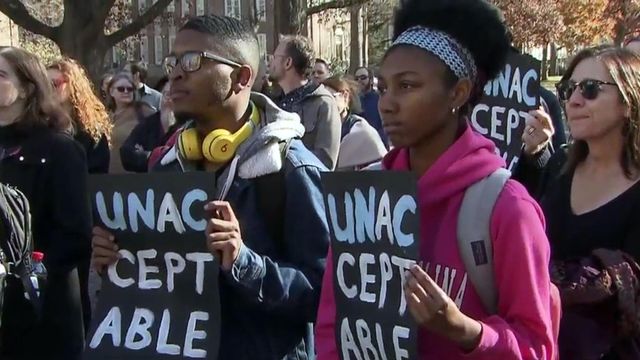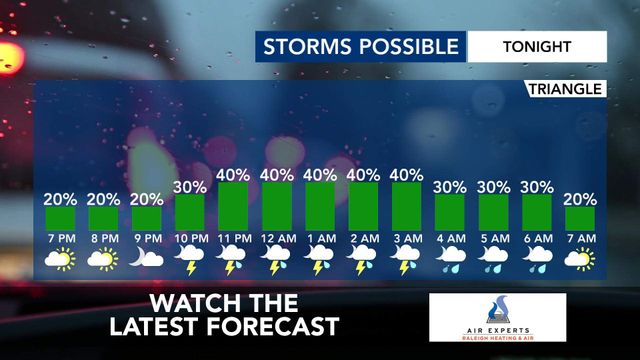Protesters say 'Silent Sam' deal promotes white nationalism
About 200 protestors called on alumni Thursday to stop giving money to the University of North Carolina at Chapel Hill in the wake of a $2.5 million deal with a Confederate group to ensure the "Silent Sam" monument wouldn't return to campus.
A consent decree reached last week settles a long-running dispute over the monument, which held a prominent place on the Chapel Hill campus for more than a century before protesters toppled it in August 2018. Former Chancellor Carol Folt had crews remove the statue's pedestal in January.
Silent Sam backers insisted that the monument return to campus under a 2015 state law governing such memorials on public property, but student, faculty and alumni groups were adamant that the monument not return, calling it a racist symbol of the past.
Under the consent decree, the North Carolina Division of the Sons of Confederate Veterans agreed to take possession of the monument and would receive $2.5 million in private university donations to provide a new home for Silent Sam, as long as it's not located in any of the 14 counties in North Carolina that is home to a UNC campus.
"The university should not be continuing to negotiate with white supremacists, continuing to be complicit in white supremacy and fund them and give them power to do whatever they want," said student Tamia Sanders, who helped organize the protest.
Sanders said th $2.5 million should have gone to pay living wages to university workers or to support minority students. She and others called the deal "Silent Sham," and they want UNC to rescind it or conduct an investigation into it.
"I know many of you oppose the payment to the charitable trust and object to the SCV displaying the monument anywhere. I understand, appreciate and empathize with those sentiments," Interim Chancellor Kevin Guskiewicz said in a statement Friday.
"The settlement ensures the monument will never return to campus, but issues of racism and injustice persist, and the university must confront them," Guskiewicz said. "I now want to focus on our shared values of diversity, equity and inclusion, and I will continue to reject and condemn those individuals or groups who seek to divide us. We have a lot of work to do to thoroughly address and reconcile with our past."
The $2.5 million comes from "unrestricted accumulated investment earnings," he said, adding that no state funds, tuition or donor money will be used. He also said he plans to establish a fund in the coming weeks to support the work of groups regarding UNC-Chapel Hill's racial history.
Kevin Stone, the state leader of the Sons of Confederate Veterans and a state probation officer in Chatham County, admitted in a letter to SCV members that the group hadn’t even filed a lawsuit against UNC-Chapel Hill over Silent Sam when the deal for the monument's future was made.
Stone also noted that the group had asked for $500,000 in the deal, not the $2.5 million the university is providing.
William Sturkey, an assistant professor of history at UNC-Chapel Hill, said the school is basically giving the Sons of Confederate Veterans a new state headquarters building to enshrine the statue.
"The most astonishing thing about it is that our university has never spent that type of money on studying and teaching its own history," Sturkey said.
The UNC-Chapel Hill Board of Trustees proposed a year ago to spend more than $5 million on a center on campus to house Silent Sam and other exhibits to put the monument in historical context. But the UNC Board of Governors scuttled that idea over cost and safety concerns and put together a committee that crafted last week's deal.
Sturkey wrote a column that ran in The New York Times on Wednesday, calling the Sons of Confederate Veterans deal "a subsidy for white nationalism."
"In many cases, as the monuments were dedicated, they said this is for white supremacy," he said Thursday. "So, groups that echo these messages are pretty clearly white nationalist groups."
Stone declined to comment Thursday when asked about accusation that the Sons of Confederate Veterans is a white supremacist group.










